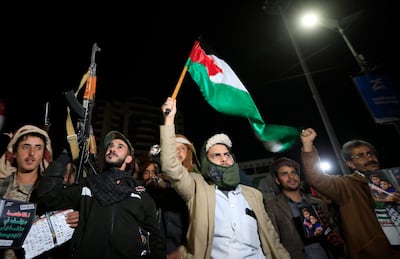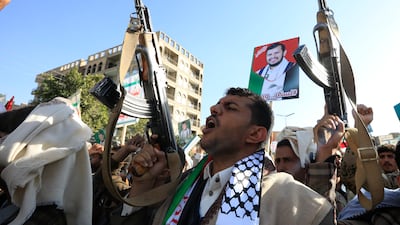Yemen's warring parties are currently considering a preliminary ceasefire to allow peace negotiations, sources close to the talks told The National.
The Iran-backed Houthis and the internationally recognised government of Yemen have largely agreed to a proposed road map.
However, the critical point of contention is the Houthi rebels’ attacks against ships in the Red Sea, which the armed group argues is unrelated to the peace efforts, the sources added.
“The Yemeni government and the Houthis received the final draft of the agreement regarding a ceasefire from the office of the UN envoy,” said a Yemeni government official close to the negotiations.
“The agreement is expected to be announced soon. It should lead to a ceasefire and comprehensive political negotiations before a lasting peace. The only issue that might cause a delay is the Houthis actions in the Red Sea.”
A second Yemeni official involved in the negotiations told The National that the draft agreement has reached the warring parties. “Some western capitals, which have condemned Houthi attacks against trade ships, have questioned the timing and requested further consultations before announcing it,” the official said.
“The Houthis are arguing that their actions are unrelated to the attacks."
The office of the UN envoy for Yemen did not immediately respond to a request for comment.
The Iran-backed group, a Hamas ally, has recently attacked several other ships in the Red Sea, claiming they were linked to Israel. The Houthis have said they will continue their attacks on ships believed to be bound for Israel while the Israelis continue their war in Gaza, where more than 18,400 people have been killed.
In the months running up to the Israeli war on Gaza following the Hamas attacks on October 7, which killed about 1,200 people, there had been relative optimism on prospects for peace in the war-torn country, which has been ravaged by one of the world's largest humanitarian crises.
A UN-brokered ceasefire in April last year reduced fighting to a level that has largely held, despite the truce expiring six months later. In September, Saudi Arabia hosted Houthi representatives for several days of talks, in the first official visit by a Houthi delegation to the kingdom since 2014.
Tim Lenderking, the US special envoy to Yemen, warned last month that peace efforts there must not be wasted as Washington works to contain the war in Gaza from escalating across the Middle East.
“We’ve made tremendous progress on the peace process, and these peace efforts should not be squandered,” Mr Lenderking earlier told The National. “We advise all parties to not widen this conflict."
Mr Lenderking was in the Middle East last week as Washington intensified efforts to stabilise the situation in the Red Sea.

His visit coincided with Washington issuing its first round of Houthi-targeted sanctions since the outbreak of the Israel-Gaza war. US President Joe Biden's administration imposed sanctions on 13 people and entities over claims they have provided “tens of millions of dollars” in Iran-linked funds to the rebel group.
The Houthis responded by saying that any US measures against them would be considered a “declaration of war". But despite the sanctions and warnings, the talks leading to a ceasefire agreement and the road map “have continued to be positive", according to an Arab diplomat close to the Yemeni file.
“The agreement is focused on stopping the war and easing the humanitarian situation before going into the peace negotiations,” added the official.
The White House believes that Iran's Islamic Revolutionary Guard Corps is helping the Houthis to carry out their attacks on vessels in the high-traffic maritime region.
A State Department official told The National last week that recent escalations in the Red Sea were “threatening almost two years of joint progress to end the war in Yemen".
“Escalation and regional war in the Middle East is not good for peace in Yemen,” the official said.
Last week, UN Special Envoy for Yemen Hans Grundberg met senior Omani officials in Muscat to "discuss regional efforts in support of UN peace mediation in Yemen", his office said.
Oman has been actively mediating between the warring parties for years.
Mr Grundberg also met Houthi spokesman Mohamad Abdelsalam, "to explore ways to advance towards an agreement to improve living conditions in Yemen, a sustainable nationwide ceasefire, and the resumption of an inclusive political process under UN auspices", Mr Grundberg's office said.
The Houthi spokesman said the meeting included conversations about the "humanitarian, political and military track" of negotiations, payment of the salaries of public servants and the release of prisoners and detainees, as well as the exit of all "foreign forces" from Yemen.
"The humanitarian imperative must supersede all the other tracks," Yemen's former deputy foreign minister Mustapha Al Noman told The National.
"Yemenis have suffered for nine years and are looking forward to the official end of the war and possibly a political process."


